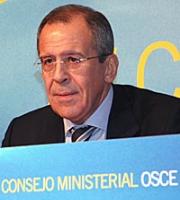MOSCOW -- The Russian government has resumed its attacks on the Organization for Security and Cooperation in Europe (OSCE), criticizing it for focusing too much on democracy and human rights to the neglect of security and economic issues. The United States, meanwhile, is resisting functional changes to the organization while calling for increased attention to the area of the former Soviet Union. The OSCE is perhaps Europe's most comprehensive security institution in terms of both membership and areas of responsibility. It has 55 member states -- including Canada, the United States, Russia and most European and Central Asian countries -- and concerns itself with political, economic, and security issues. The OSCE seeks to reduce political, economic, and social factors within societies that could contribute to instability and terrorism, such as unfair elections, unjustified restrictions on freedom of expression, and discrimination based on religion, ethnicity, or other improper considerations. Besides supporting civil liberties, free elections, and access to information (e.g., eliminating restrictions on Internet usage), the organization also advocates liberal economic reforms. Lacking the extensive institutional resources of NATO or the European Union, the OSCE's leverage over its members derives mainly from its prestige and respect. Its Office for Democratic Institutions and Human Rights (ODIHR) sends electoral observers to member states. Since their assessment regarding a ballot's fairness has a major impact on whether the international community deems an election legitimate, governments seek its endorsement. In addition, President Nursultan Nazarbayev's desire to assume chairmanship of the OSCE in 2009 appears to have contributed to the recent introduction of economic and political reforms in Kazakhstan. (Although Russia and the other Central Asia countries support Nazarbayev's candidacy, British and U.S. officials say that continuing human rights problems in Kazakhstan make it premature to offer Kazakhstan the OSCE chairmanship in 2009.)
Moscow, Washington Have Differing Visions for OSCE

